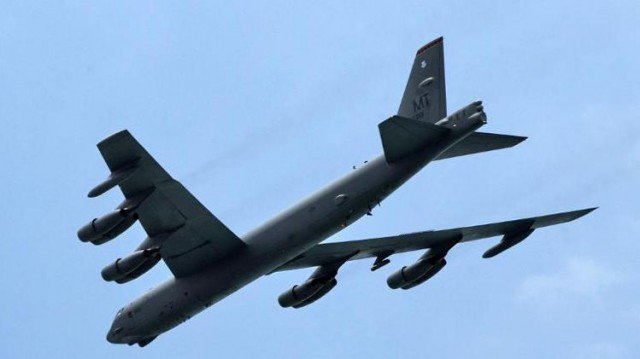
Two US B-52 bombers flew over disputed islands in the East China Sea in defiance of new China’s air defense rules, officials say.
China set up its “air defense identification zone” on Saturday insisting that aircraft obey its rules or face “emergency defensive measures”.
A Pentagon spokesman said the planes had followed “normal procedures”.
The islands, known as Senkaku in Japan and Diaoyu in China, are a source of rising tension between the two nations.
Japan has dismissed the Chinese defense zone as “not valid at all” and two of its biggest airlines announced on Tuesday they would heed a request from the government in Tokyo not to implement the new rules.
US Colonel Steve Warren at the Pentagon said Washington had “conducted operations in the area of the Senkakus”.
“We have continued to follow our normal procedures, which include not filing flight plans, not radioing ahead and not registering our frequencies,” he said.

There had been no response from China, he added.
The aircraft, which were unarmed, had taken off from Guam on Monday and the flight was part of a regular exercise in the area, US defense officials said. Both planes later returned to Guam.
The US – which has more than 70,000 troops in Japan and South Korea – had previously said it would not abide by the Chinese-imposed zone.
US Defense Secretary Chuck Hagel called it a “destabilizing attempt to alter the status quo in the region”. The White House said it was “unnecessarily inflammatory”.
Japan has already lodged a strong protest over what it said was an “escalation” by China.
Taiwan, which also claims the islands, expressed regret at the Chinese move and promised that its military would take measures to protect national security.
In its statement announcing the air defense zone on Saturday, the Chinese defense ministry said aircraft must report a flight plan, “maintain two-way radio communications”, and “respond in a timely and accurate manner” to identification inquiries.
“China’s armed forces will adopt defensive emergency measures to respond to aircraft that do not co-operate in the identification or refuse to follow the instructions,” the statement said.
Japan Airlines and All Nippon Airlines said on Tuesday they would stop filing flight plans demanded by China on routes through the zone following a request from the Japanese government.
Singapore Airlines and Australia’s Qantas have both said they will abide by the new rules.
However, Australia summoned the Chinese ambassador on Tuesday to express opposition over the zone.
Australia’s Foreign Minister Julie Bishop said “the timing and manner” of China’s announcement were “unhelpful in light of current regional tensions”.
[youtube tvKcqXdj8vE 650]